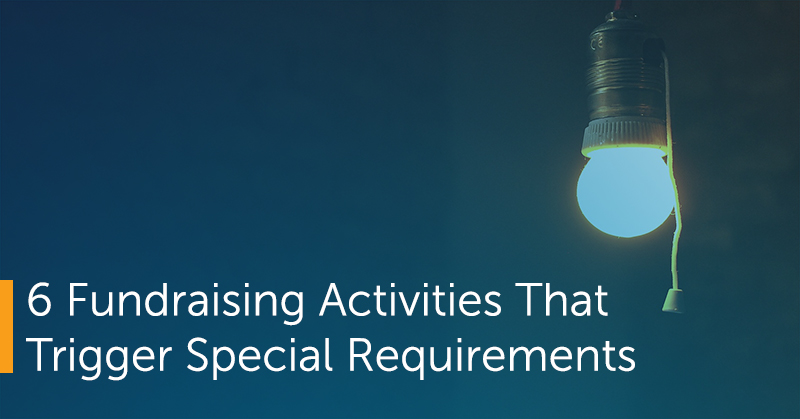-
Software
Compliance Software
Oversee licenses, track renewals, access documents, and more from a single interface.
Software Overview -
Services
Compliance Services
Full service compliance solutions for organizations throughout their entire lifecycles.
Services Overview -
Industries
-
Partner
- Information Center
6 Fundraising Activities That Trigger Special Requirements

Raffling a quilt? Working on a grant application? Hiring a consultant to work on a new email campaign? When you’re looking for creative new ways to reach out and drive support for your mission, regulatory due diligence is generally not top of mind. Yet these activities are regulated under many state charity laws.
To help you meet state requirements without diverting precious time and energy away from your campaign, we’ve put together this brief overview of six fundraising activities that trigger special requirements in many states, along with resources to help you ensure compliance with minimal time and distraction.
1. Fundraising online
Fundraising simply means asking for donations, regardless of the means. For example, asking for donations in person, online, on your website, on social media, or in your email newsletter are all fundraising appeals. And since fundraising happens wherever the message is received, regardless of whether you get a donation in response, fundraising appeals made online mean you’re potentially fundraising in all 50 states. That’s the beauty of online fundraising, as it can be a very cost effective method of fundraising when done right. Sending appeals to an email list including recipients from unknown or widespread territories is casting a similarly wide net.
Currently, 41 states require nonprofits to register to solicit donations from their residents, and 25 require special disclosure language to be included in solicitations. You can find a clickable map of the requirements, along with specific instructions for every state, on our website.
2. Grant requests
Nonprofit leaders are often surprised to learn that grant applications, as a request for funds, meet the general definition of solicitation under most state charity laws, subject to registration requirements. A handful of state laws specifically address the question of grant applications. For example, Wisconsin, Washington, Florida, and Hawaii provide limited exclusions for some types of grant applications, while Utah specifically includes grant seeking in its definition of charitable solicitation.
If you aren’t registered for fundraising in a state where you would like to submit a grant application, check the state’s charity law for specific guidance, or reach out to a specialist.
3. Hiring a fundraising professional
Getting outside help with your fundraising efforts also requires reports or registrations in many states. Each state defines different professional fundraising roles, but generally, a fundraising professional is an independent person or firm (not an employee of your nonprofit) who is paid to assist with fundraising. A professional solicitor raises funds directly, while a fundraising counsel provides other support such as strategic advice or event management.
Both types of fundraising professionals must register in many states. In addition, hiring a professional fundraiser imposes extra requirements on your nonprofit, such as requiring you to register for fundraising in a state where you are otherwise exempt.
You can learn more about requirements for professional fundraisers of every type, as well as nonprofits working with them, in our professional fundraiser guide.
4. Commercial co-ventures
Coupon nights and point-of-sale donation requests are examples of commercial co-ventures, agreements between businesses and nonprofits that channel a portion of profits into a charitable cause. These campaigns have proven popular with consumers eager to see their purchases support a worthy cause. Yet co-venturing carries detailed requirements in roughly half of states. You can find what you need to know to run a successful campaign in our commercial co-venture guide.
5. Charitable gaming
Bingo, raffles, casino nights, and other types of gaming can be a fun and entertaining way to build awareness and support for your mission. But these activities usually require state licenses, local permits, or both. Our charitable gaming compliance guide provides everything you need to set up a successful event.
6. Charitable gift annuities
Charitable gift annuities allow donors to make a substantial donation to a charity in return for tax benefits and a lifetime income stream. Universities, hospitals, and other institutions are common recipients. Due to their financial complexity, charitable gift annuities are subject to strict requirements in most states. To find out if your organization might benefit, or to explore the requirements, consult our charitable gift annuity guide.
7. Many fundraising ideas, one simple solution
All of these types of fundraising are covered in detail in our online Fundraising Compliance Guide, along with state-by-state contact information and filing instructions. Bookmark it now, and you’ll never have to go hunting for state registration requirements again.
If you want to make things easier yet, you can simply give us a call and tell us what you have in mind. We’ll handle the state paperwork from there, so you can get back to the exciting part: finding new, creative ideas to engage supporters and drive your mission forward.
Call 1-888-995-5895, or contact us.





